India has a rich history of using spices not only for culinary purposes but also for their medicinal properties. Spices are integral to Ayurveda, the ancient Indian system of medicine, where they are used to maintain health and prevent disease. From digestion to inflammation, spices offer a myriad of health benefits when incorporated into daily life. In this article, we will explore ten powerful Indian spices, each with unique medicinal benefits and practical ways to consume them regularly for optimal health.

- Turmeric (Haldi) – The Golden Healer
Turmeric is often referred to as “Indian gold,” not just for its vibrant color but also for its extensive medicinal properties. Its active compound, curcumin, is a potent anti-inflammatory and antioxidant, making it an essential ingredient in managing chronic diseases like arthritis, heart disease, and cancer. Moreover, turmeric boosts brain function and lowers the risk of neurodegenerative diseases like Alzheimer’s, thanks to its ability to increase brain-derived neurotrophic factor (BDNF).
Regular consumption of turmeric can be as simple as adding it to curries, soups, and smoothies. A popular way to enjoy its benefits is by drinking Golden Milk—a mixture of turmeric powder and warm milk—before bed. Curcumin supplements are also available for those looking for concentrated doses, but it’s important to note that black pepper should be taken alongside turmeric to enhance curcumin absorption.
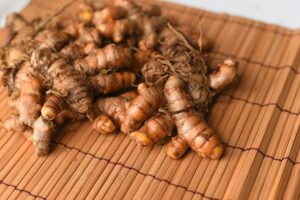
How to Consume Daily:
- Add turmeric powder to curries, soups, and smoothies.
- Drink turmeric milk (Golden Milk) before bed, mixing a teaspoon of turmeric with warm milk.
- Take turmeric supplements for concentrated curcumin intake (after consulting a doctor).
- Ginger (Adrak) – The Digestive Dynamo
Ginger is a staple in Indian households, especially for its ability to relieve nausea, indigestion, and muscle soreness. The compound gingerol gives ginger its medicinal kick, making it effective for reducing joint pain and boosting immunity. In addition to being a digestive aid, ginger also has anti-inflammatory and antioxidant properties that protect against oxidative stress.
One of the simplest ways to consume ginger is by making ginger tea. Grating fresh ginger into hot water provides a soothing drink, ideal for digestive health and cold relief. Ginger can also be added to stir-fries, curries, or smoothies. For those struggling with nausea, chewing on small slices of raw ginger offers quick relief. Ginger supplements are also widely available, though fresh ginger is often the most effective.
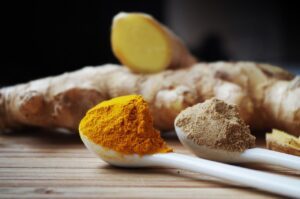
How to Consume Daily:
- Grate fresh ginger into hot water for ginger tea.
- Add ginger to stir-fries, soups, or smoothies.
- Chew on small slices of raw ginger to reduce nausea or take ginger supplements.
- Cumin (Jeera) – The Digestive Booster
Cumin is a culinary favorite known for its distinct flavor and powerful health benefits. It improves digestion by stimulating the secretion of digestive enzymes, making it particularly useful in reducing bloating and indigestion. Rich in iron, cumin also boosts the immune system and helps in managing blood sugar levels.
One of the most popular ways to consume cumin daily is through jeera water. By soaking cumin seeds in water overnight and drinking the water on an empty stomach in the morning, many people report improved digestion and weight management. Cumin can also be added to curries, soups, and salad dressings, or roasted and sprinkled on top of meals as a flavorful garnish.
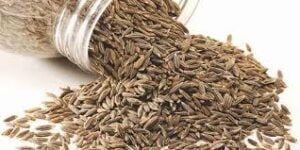
How to Consume Daily:
- Drink jeera water: soak a teaspoon of cumin seeds in water overnight and drink it in the morning on an empty stomach.
- Add cumin powder to curries, stews, or salad dressings.
- Roast cumin seeds and sprinkle them on salads or use as a garnish.
- Fenugreek (Methi) – The Blood Sugar Balancer
Fenugreek seeds are packed with soluble fiber, making them an excellent spice for regulating blood sugar levels, particularly for those with diabetes. In addition to improving digestion, fenugreek also reduces inflammation and can help increase milk production in nursing mothers.
To harness the health benefits of fenugreek, try soaking the seeds in water overnight and drinking the water first thing in the morning. Fenugreek leaves are also commonly used in Indian cuisine, and they can be added to curries, soups, or stir-fries. Fenugreek supplements are another option for those who prefer a more concentrated form.

How to Consume Daily:
- Soak fenugreek seeds in water overnight and drink the water first thing in the morning.
- Add fenugreek leaves to curries, soups, or stir-fries.
- Use fenugreek seeds as a spice or take fenugreek supplements.
- Cinnamon (Dalchini) – The Sugar Regulator
Cinnamon is a spice that not only enhances the flavor of foods but also offers a wealth of medicinal benefits. One of its most important roles is in lowering blood sugar levels, making it a valuable spice for managing diabetes. Cinnamon also has antimicrobial properties, helping to combat infections and promote heart health by reducing cholesterol and triglyceride levels.
Incorporating cinnamon into your daily routine is easy. You can add a pinch of cinnamon powder to your morning coffee or tea, sprinkle it over oatmeal or yogurt, or use it in baking. Cinnamon sticks can also be used in curries, stews, or to infuse water for a refreshing and healthy drink.
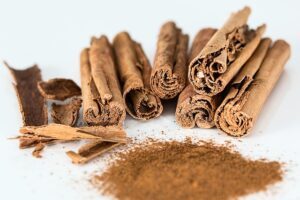
How to Consume Daily:
- Add a pinch of cinnamon powder to your morning coffee or tea.
- Sprinkle cinnamon over oatmeal, smoothies, or desserts.
- Use cinnamon sticks in stews, curries, or infuse in water for a refreshing drink.
- Black Pepper (Kali Mirch) – The Nutrient Absorber
Often referred to as the “king of spices,” black pepper not only adds a fiery kick to dishes but also improves nutrient absorption, particularly of curcumin from turmeric. Its ability to stimulate digestive enzymes makes it beneficial for gut health, and its antibacterial properties help fight infections.
Using freshly ground black pepper is the best way to enjoy its health benefits. Sprinkle it on salads, soups, eggs, or any savory dish for added flavor and medicinal value. Black pepper is often combined with turmeric to enhance curcumin absorption, making it a powerful duo for overall health.
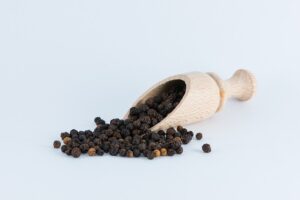
How to Consume Daily:
- Add freshly ground black pepper to salads, soups, or any savory dish.
- Use black pepper in combination with turmeric to enhance curcumin absorption.
- Sprinkle it on eggs, vegetables, or grilled meats for flavor and health benefits.
- Cloves (Laung) – The Oral Health Protector
Cloves are renowned for their ability to relieve toothache due to their anesthetic properties. They are also rich in antioxidants and have strong anti-inflammatory and antibacterial effects. Cloves help improve digestion by stimulating digestive enzymes and reducing bloating.
Clove tea is a popular way to enjoy its digestive benefits, while ground cloves can be added to baked goods or spice blends for savory dishes. For toothaches or gum pain, chewing on a clove provides immediate relief, and clove oil, when diluted with water, can be applied directly to the affected area.
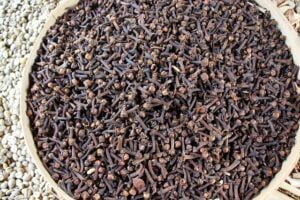
How to Consume Daily:
- Add cloves to tea or warm water for a soothing digestive drink.
- Use ground cloves in baked goods or spice blends for savory dishes.
- Chew a clove for toothache relief or take clove oil diluted with water.
- Cardamom (Elaichi) – The Detoxifier
Cardamom is a spice that not only enhances the flavor of dishes but also offers medicinal benefits, particularly for digestive health. It helps reduce bloating, indigestion, and acidity. Additionally, cardamom acts as a natural breath freshener and has diuretic properties, which help in detoxifying the body and reducing water retention.
To consume cardamom daily, add it to chai tea or chew on a pod after meals to aid digestion and freshen breath. Cardamom is also used in desserts like rice pudding or kheer and in savory dishes such as curries and biryanis.
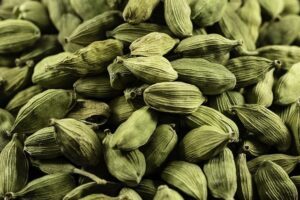
How to Consume Daily:
- Add cardamom pods or ground cardamom to chai tea.
- Use cardamom in desserts like rice pudding or savory dishes like curries.
- Chew on a cardamom pod to freshen breath and improve digestion.
- Fennel Seeds (Saunf) – The Digestive Soother
Fennel seeds are widely used in India as a digestive aid, particularly after meals. They help relieve bloating, gas, and digestive discomfort while also improving eye health due to their rich antioxidant content, including vitamin C and beta-carotene. Fennel also helps regulate blood pressure due to its high potassium content.
Chewing fennel seeds after meals is a common practice that aids in digestion. Fennel tea, made by steeping the seeds in hot water, is another popular option for those looking to soothe their digestive system. Fennel can also be added to salads, bread, or vegetable dishes for both flavor and health benefits.
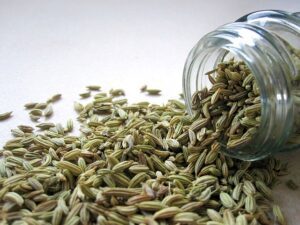
How to Consume Daily:
- Chew a teaspoon of fennel seeds after meals to aid digestion.
- Make fennel tea by steeping the seeds in hot water.
- Add fennel seeds to salads, bread, or vegetable dishes for extra flavor and benefits.
- Mustard Seeds (Sarson) – The Metabolism Booster
Mustard seeds are known for their ability to boost metabolism and promote fat burning. They also have anti-inflammatory properties, making them beneficial for conditions like arthritis. Mustard seeds stimulate digestive enzymes, improving gut health and overall digestion.
Mustard seeds can be added to pickles, salad dressings, or spice mixes, or used in cooking. Mustard oil is also widely used in Indian cooking and can be applied as a massage oil to relieve muscle pain and inflammation. The seeds are a versatile spice that can be incorporated into a variety of dishes, from curries to stir-fries.

How to Consume Daily:
- Add mustard seeds to salad dressings, pickles, or spice mixes.
- Use mustard oil for cooking or as a massage oil to relieve muscle pain and inflammation.
- Include mustard seeds in curries, stir-fries, or spice blends.
Conclusion
Each of these spices offers unique medicinal benefits, ranging from improved digestion and blood sugar regulation to enhanced immune function and anti-inflammatory properties. By incorporating them into your daily routine, you can enjoy not only their flavor but also their health-boosting effects. Whether through teas, curries, or supplements, these spices provide an easy and natural way to promote well-being and prevent disease. Indian cuisine has long known the value of these spices, and now, with modern science backing up ancient wisdom, it’s easier than ever to integrate them into your diet for a healthier life.
Also Read: India: A Land of Miracles Over Its Superb Historical Monuments
Please like and subscribe news letter to stay updated on the latest content!
Hurry - Buy this now or Pay More - Get Huge Discounts
JBL Tune Flex – True Wireless Noise Cancelling Earbuds (Black), Small) – Huge Discount

Buy on Amazon-Pay $49 – 50% Discount
Bose QuietComfort Bluetooth Headphones, Wireless Headphones, Over Ear Noise Cancelling Headphones with Mic, Up To 24 Hours of Battery Life, White Smoke – Discounted Rate

Buy on Amazon – Save $43.00 (72%)
Massage Gun, Muscle Massage Gun for Athletes Handheld Electric Deep Tissue Back Massager, Percussion Massage Device for Pain Relief with 30 Speed Levels 9 Heads

Amazon Echo Dot (5th Gen, 2022 release) | With bigger vibrant sound, helpful routines and Alexa | Glacier White

SAMSUNG Galaxy Tab S6 Lite (2024) 10.4″ 64GB WiFi Android Tablet, S Pen Included, Gaming Ready, Long Battery Life, Slim Metal Design, Expandable Storage, US Version, Mint, Amazon Exclusive

JBL TUNE 770NC – Adaptive Noise Cancelling with Smart Ambient Wireless Over-Ear Headphones, Bluetooth 5.3, Up to 70H battery life with speed charge, Lightweight, comfortable & foldable design (Blue)

Upgraded 3-in-1 Car Phone Holder Mount [Powerful Suction] Phone Mount for Car Dashboard Air Vent Windshield,for All iPhone Android Phone (Black)

Bluetooth Speaker with HD Sound, Portable Wireless, IPX5 Waterproof, Up to 24H Playtime, TWS Pairing, BT5.3, for Home/Party/Outdoor/Beach, Electronic Gadgets, Birthday Gift (Black)


4 thoughts on “10 Powerful Indian Spices: Unlock Their Incredible Health Benefits in Your Daily Life”